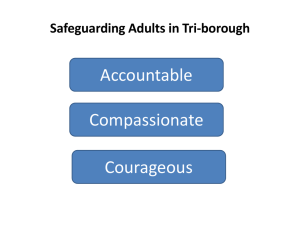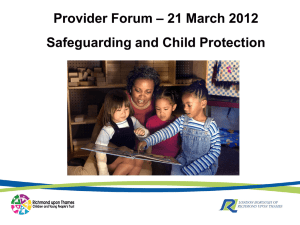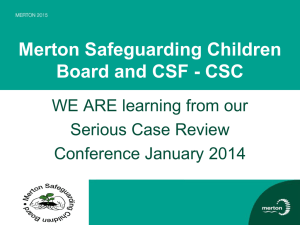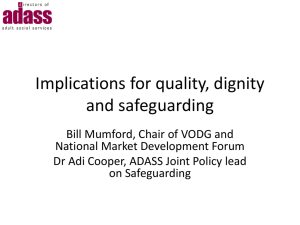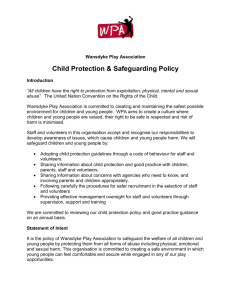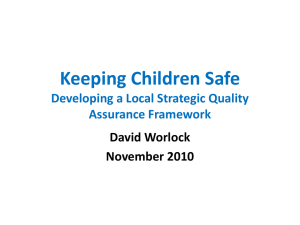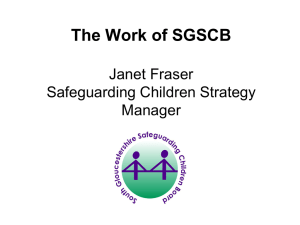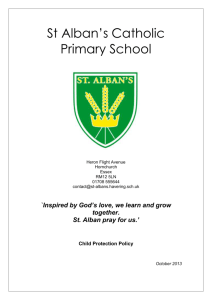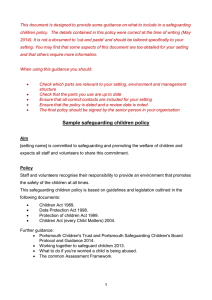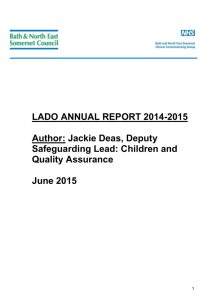CMEH Child Safeguarding Policy
advertisement
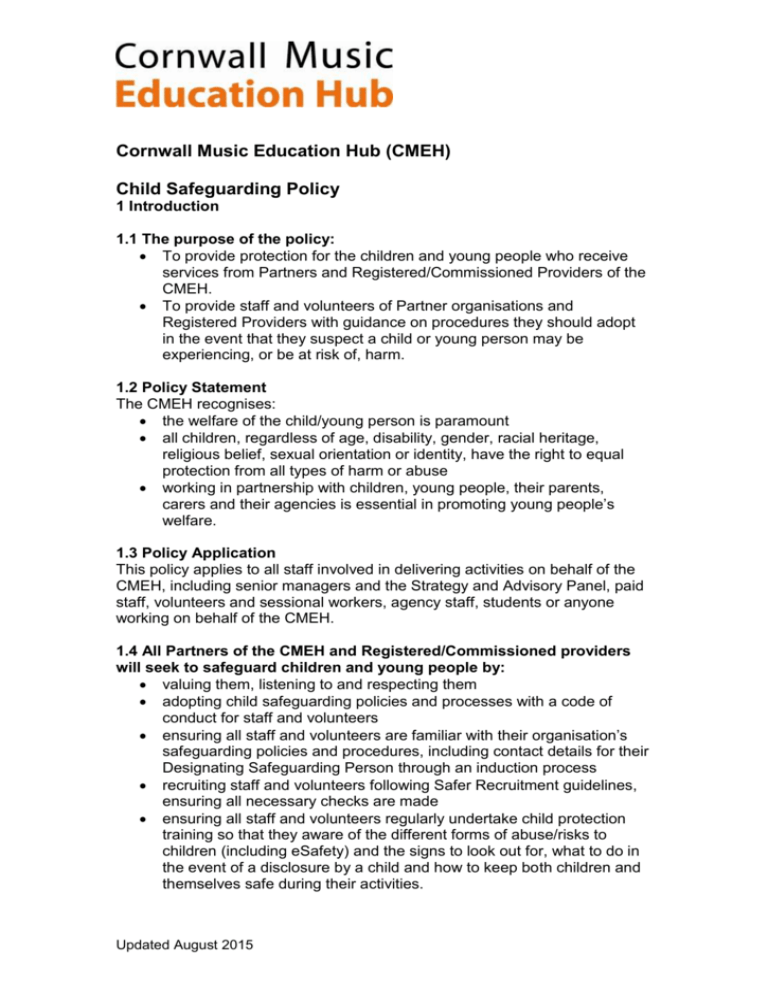
Cornwall Music Education Hub (CMEH) Child Safeguarding Policy 1 Introduction 1.1 The purpose of the policy: To provide protection for the children and young people who receive services from Partners and Registered/Commissioned Providers of the CMEH. To provide staff and volunteers of Partner organisations and Registered Providers with guidance on procedures they should adopt in the event that they suspect a child or young person may be experiencing, or be at risk of, harm. 1.2 Policy Statement The CMEH recognises: the welfare of the child/young person is paramount all children, regardless of age, disability, gender, racial heritage, religious belief, sexual orientation or identity, have the right to equal protection from all types of harm or abuse working in partnership with children, young people, their parents, carers and their agencies is essential in promoting young people’s welfare. 1.3 Policy Application This policy applies to all staff involved in delivering activities on behalf of the CMEH, including senior managers and the Strategy and Advisory Panel, paid staff, volunteers and sessional workers, agency staff, students or anyone working on behalf of the CMEH. 1.4 All Partners of the CMEH and Registered/Commissioned providers will seek to safeguard children and young people by: valuing them, listening to and respecting them adopting child safeguarding policies and processes with a code of conduct for staff and volunteers ensuring all staff and volunteers are familiar with their organisation’s safeguarding policies and procedures, including contact details for their Designating Safeguarding Person through an induction process recruiting staff and volunteers following Safer Recruitment guidelines, ensuring all necessary checks are made ensuring all staff and volunteers regularly undertake child protection training so that they aware of the different forms of abuse/risks to children (including eSafety) and the signs to look out for, what to do in the event of a disclosure by a child and how to keep both children and themselves safe during their activities. Updated August 2015 sharing information about concerns with agencies who need to know, and involving parents and children appropriately providing effective management for staff and volunteers through supervision, support and training around safeguarding and best practice. Part 2 – Responsibilities 2.1 Designated Safeguarding Person Each Partner and Registered Provider within the CMEH partnership will have its own Designated Safeguarding Person (DSP) who is designated: To act as the first point of contact for staff or volunteers concerned about the safety and welfare of a child To be responsible for contacting the Children’s Social Care Department in cases where a child is at risk of harm To be familiar with Local Safeguarding Children Board (LSCB) procedures To ensure that all staff/volunteers know are familiar with child safeguarding policies and procedures. To advise and provide guidance to staff concerned about a child protection issue To liaise with appropriate local agencies for support and advice and keep a list of local contacts To organise training of staff about how to respond to child protection concerns To collect monitoring data on all safeguarding activities across the organisation 2.2 All staff and volunteers All CMEH Partner or Registered/Commissioned Provider staff and volunteers have a responsibility for the protection of children engaged in CMEH activities. It is their role: To be familiar with their organisation’s own child safeguarding policy and follow the recommendations laid out in the safe code of conduct. To ensure that all activities that are delivered are done so in a safe manner, having been risk assessed and with adult/child ratios in place that are appropriate to the age of the young people involved and the activity taking place. Staff should also take into account the general behaviour and maturity of the young people involved, gender balances, access to First Aid support and supervision in the event of an emergency when considering staffing ratios To respond appropriately to and report concerns about a child to their DSP To keep accurate records of concerns about children and actions taken To ensure parents, carers, children and young people are aware of the organisation’s safeguarding policy and procedures Updated August 2015 3 Procedure for handling concerns over the welfare of a child or young person 3.1. Reporting a concern All staff have a responsibility to ensure concerns about children, no matter how unclear, are passed on and assessed. Staff should not undertake any investigations. Staff should provide a written account of a disclosure or concerns to the organisation’s Designated Safeguarding Person, who should contact the Children’s Social Care Department. 3.2 Procedure in the absence of own DSP In the absence of the organisation’s own DSP, Partners and their staff should contact the CMEH Manager, Tanya Moore (tmoore@cornwall.gov.uk) in the event of an urgent child protection concern relating to a child or young person involved in a CMEH activity. 4 Procedures for managing allegations against members of CMEH staff 4.1 If concerns relate to the conduct of a member of staff these should be reported to the organisation’s DSP immediately. Concerns about a member of staff may fall into any of the following three categories where someone has: Behaved in a way that has harmed the child, or may have harmed a child Possibly committed a criminal offence against or related to a child Behaved towards a child or children in a way that indicates as a member of staff s/he is unsuitable to work with children 4.2 The allegation should be reported by the DSP to the CMEH Manager, Tanya Moore, immediately, unless that person is the subject of the allegation, in which case it should be reported to the Head of Cornwall Learning, Sharon Longden. If the DSP is the subject of the allegation, then it should be another member of the Partner’s Senior Management Team that reports to the CMEH Manager. 4.3 If the allegation meets any of the criteria in the paragraph above the Manager of the Partner or commissioned provider organisation should report it to the Cornwall Local Authority Designated Officer (‘LADO’). The LADO is responsible for providing advice, liaison and monitoring the progress of cases specifically relating to allegations against members of staff, to ensure that cases are dealt with as quickly as possible, consistent with a fair and thorough process. 4.4 The police and other relevant agencies should always be consulted before informing the person who is the subject of an allegation that may possibly require a criminal investigation. The LADO will discuss the matter with the employer and, where necessary, obtain further details of the allegation and the circumstances in which it was made. Updated August 2015 4.5 If the allegation is not patently false and there is cause to suspect that a child is suffering, or is likely to suffer, significant harm, the LADO will immediately refer to children’s social care and ask for a strategy discussion to be convened straightaway. In these circumstances, the strategy discussion should include the LADO and a representative of the employer. 4.6 If there is no cause to suspect that ‘significant harm’ is an issue, but a criminal offence might have been committed, the LADO will immediately inform the police and convene a similar discussion to decide whether a police investigation is needed. That discussion should also involve the employer. 5 Confidentiality and Information Sharing 5.1 Care must be taken to ensure that both adults’ and children’s confidentiality is maintained and that information is handled and disseminated on a need to know basis only. Individuals must be confident that information held about them by CMEH will only be disclosed to others either with their consent or when there is a legal duty to do so. 5.2 Guidance allows for the disclosure of personal information without consent of the subject in certain conditions, including for the purposes of the prevention and detection of a crime, for example where there is a child protection concern. 6 Local Safeguarding Children Board The Cornwall and Isles of Scilly Safeguarding Children Board website can be found at: www.safechildren-cios.co.uk This website lists contact details for the Cornwall Council Single Referral Unit and guidance around child protection. Updated August 2015

